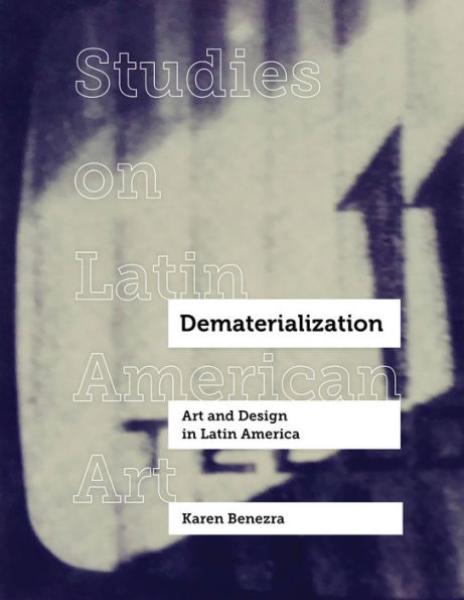Description
Dematerialization examines the intertwined experimental practices and critical discourses of art and industrial design in Argentina, Mexico, and Chile in the 1960s and 1970s. Provocative in nature, this book investigates the way that artists, critics, and designers considered the relationship between the crisis of the modernist concept of artistic medium and the radical social transformation brought about by the accelerated capitalist development of the preceding decades. Beginning with Oscar Masotta's sui generis definition of the term, Karen Benezra proposes dematerialization as a concept that allows us to see how disputes over the materiality of the art and design object functioned in order to address questions concerning the role of appearance, myth, and ideology in the dynamic logic structuring social relations in contemporary discussions of aesthetics, artistic collectivism, and industrial design. Dematerialization brings new insights to the fields of contemporary art history, critical theory, and Latin American cultural studies.
"Dematerialization studies experimental works and critical discourses that questioned the organicity, social autonomy, and techniques of modern art and industrial design in Argentina, Mexico, and Chile in the 1960s and 70s. More than merely describing the appearance of the object, the book proposes dematerialization as a concept that allows us to see how their work mobilized the materiality of art and design as a way of figuring the movement by which the social reflects upon its historical conditions and by which the aesthetic qualities and contingent sociocultural content of art and design objects function as the inextricable 'stuff' of this thought"--Provided by publisher.
"Karen Benezra offers, with impressive theoretical sophistication, new grounds for understanding the criticism, experimental art, and design practices in Argentina, Mexico, and Chile in the 1960s and 1970s. . . . [An] impressively researched and argued study that uniquely brings together artists, authors, and designers to shed light on the role of aesthetics in transforming the social in a discussion that will be of interest to art historians, critics, designers, philosophers, and cyberneticians."-- "caa.reviews"
"More than fifty years after Lucy Lippard and John Chandler published 'The Dematerialization of Art' in Art International, Karen Benezra has added significant insight to the phenomenon as it developed in Latin America. The author's efforts are magnified by a search of the literature, which reveals that as it relates to Mexico, Argentina, and Chile, not a great deal has been written in English on this subject. While it is clear that art has pretty much continued to materialize, the importance of conceptual art and the profound place it occupies in the history of twentieth and twenty-first century art cannot be denied. Benezra's close look at major figures, such as Oscar Masotta, Tomás Maldonado, Felipe Ehrenberg, and Gui Bonsiepe, each of whom contributed to this movement in 1960s and 1970s Latin America, is timely and welcome."-- "ARLIS/NA Reviews"
"Dematerialization studies experimental works and critical discourses that questioned the organicity, social autonomy, and techniques of modern art and industrial design in Argentina, Mexico, and Chile in the 1960s and 70s. More than merely describing the appearance of the object, the book proposes dematerialization as a concept that allows us to see how their work mobilized the materiality of art and design as a way of figuring the movement by which the social reflects upon its historical conditions and by which the aesthetic qualities and contingent sociocultural content of art and design objects function as the inextricable 'stuff' of this thought"--Provided by publisher.
"Karen Benezra offers, with impressive theoretical sophistication, new grounds for understanding the criticism, experimental art, and design practices in Argentina, Mexico, and Chile in the 1960s and 1970s. . . . [An] impressively researched and argued study that uniquely brings together artists, authors, and designers to shed light on the role of aesthetics in transforming the social in a discussion that will be of interest to art historians, critics, designers, philosophers, and cyberneticians."-- "caa.reviews"
"More than fifty years after Lucy Lippard and John Chandler published 'The Dematerialization of Art' in Art International, Karen Benezra has added significant insight to the phenomenon as it developed in Latin America. The author's efforts are magnified by a search of the literature, which reveals that as it relates to Mexico, Argentina, and Chile, not a great deal has been written in English on this subject. While it is clear that art has pretty much continued to materialize, the importance of conceptual art and the profound place it occupies in the history of twentieth and twenty-first century art cannot be denied. Benezra's close look at major figures, such as Oscar Masotta, Tomás Maldonado, Felipe Ehrenberg, and Gui Bonsiepe, each of whom contributed to this movement in 1960s and 1970s Latin America, is timely and welcome."-- "ARLIS/NA Reviews"
Last updated on
Product Details
- University of California Brand
- Apr 7, 2020 Pub Date:
- 0520307062 ISBN-10:
- 9780520307063 ISBN-13:
- 256 Pages
- 9.29 in * 7.4 in * 0.94 in Dimensions:
- 2 lb Weight:




